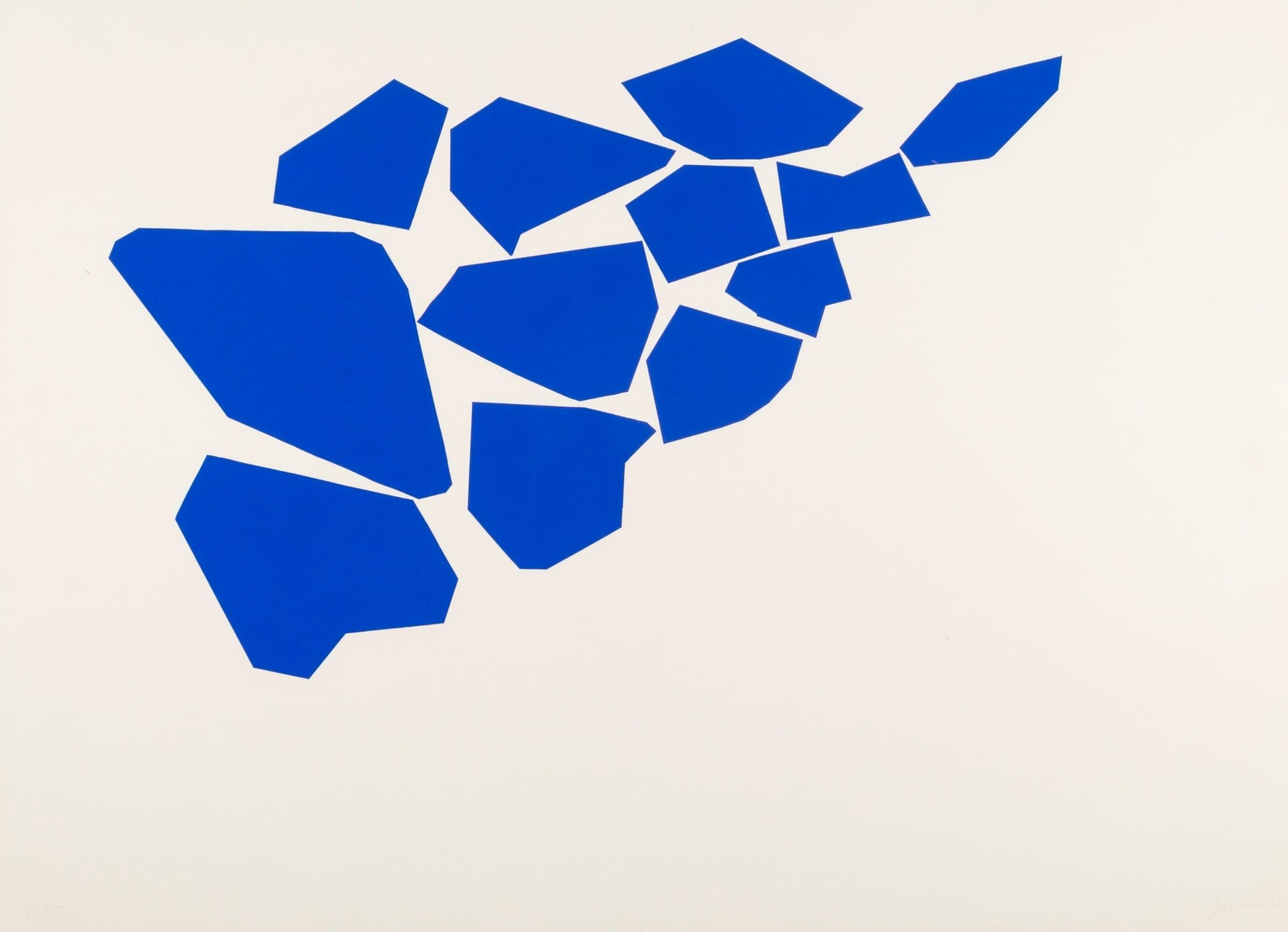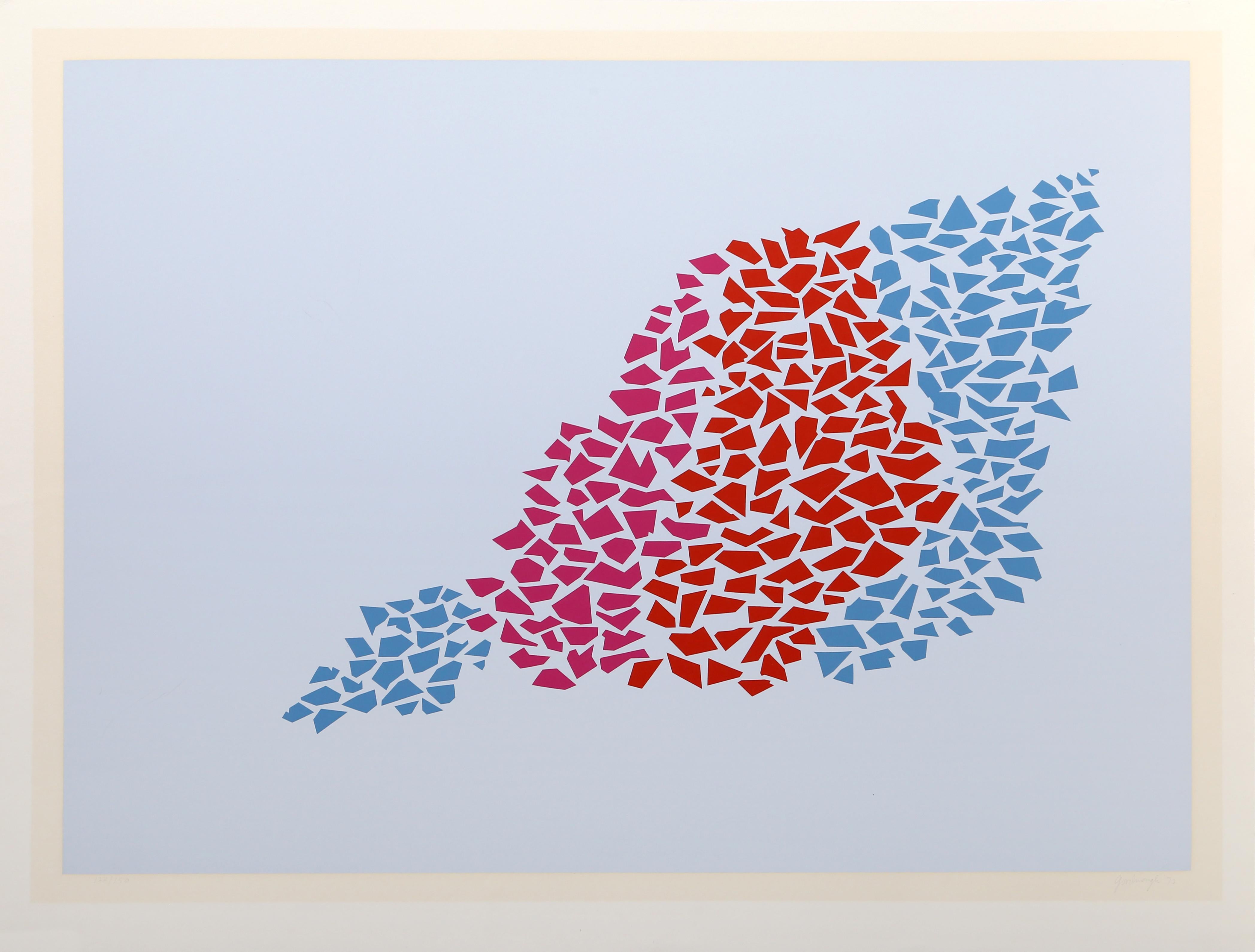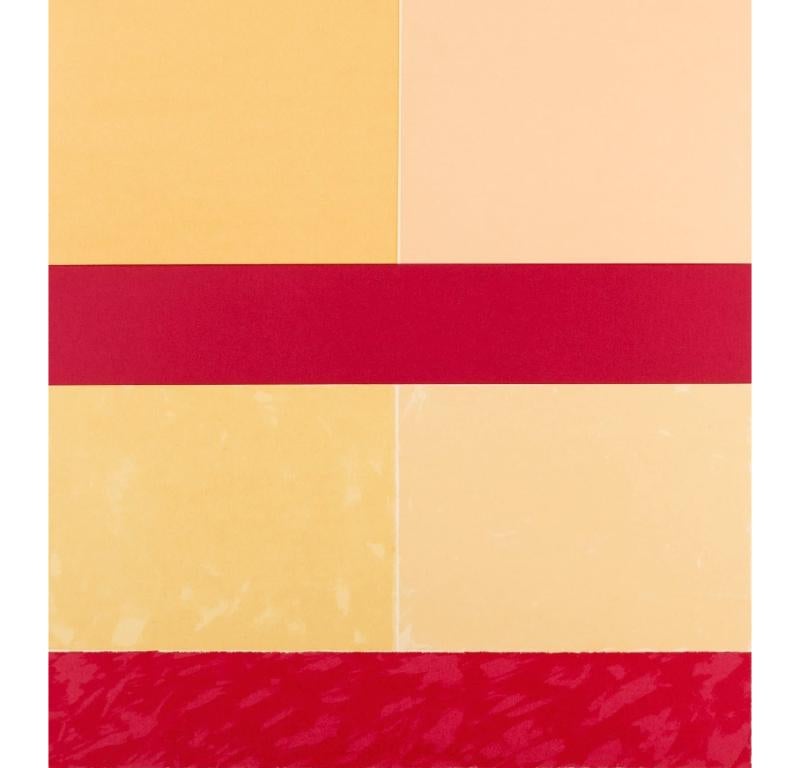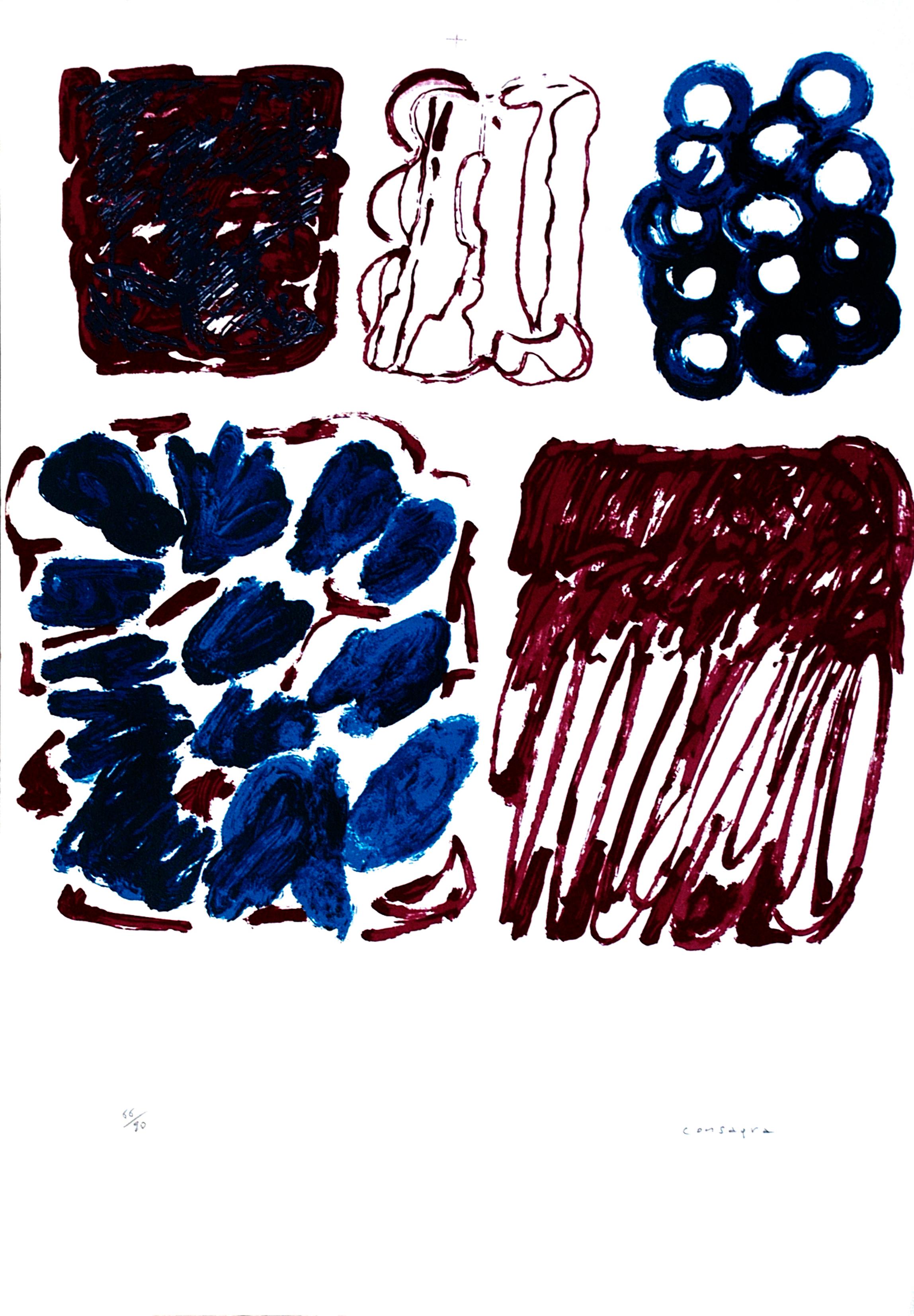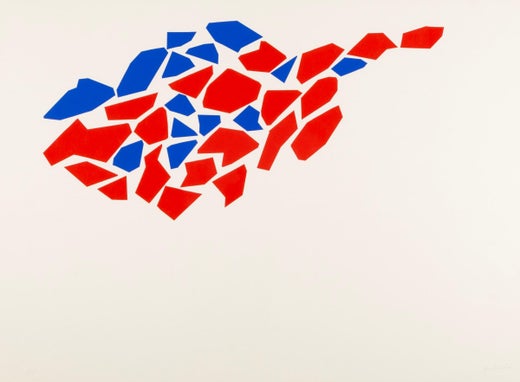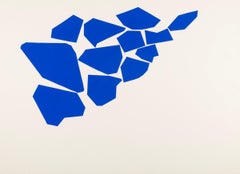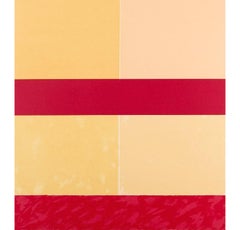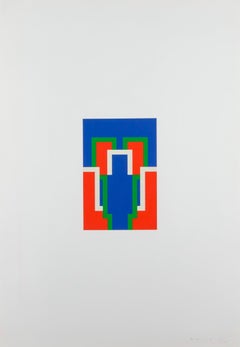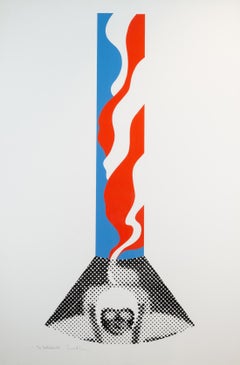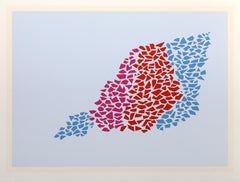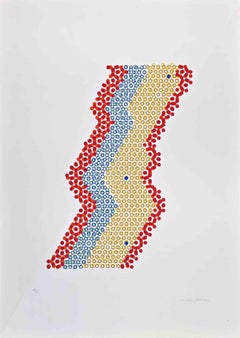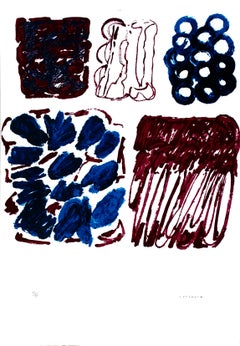Items Similar to One Two Three (Red and Blue) by Robert Goodnough, 1968
Want more images or videos?
Request additional images or videos from the seller
1 of 6
Robert Goodnough, 1917-2010One Two Three (Red and Blue) by Robert Goodnough, 19681968
1968
$1,960.74
£1,450
€1,690.13
CA$2,751.26
A$3,000.20
CHF 1,576.08
MX$35,959.16
NOK 19,986.27
SEK 18,599.11
DKK 12,623.41
About the Item
One Two Three (Red and Blue) by Robert Goodnough, 1968
Additional information:
Medium: screenprint
56 x 76 cm
22 1/8 x 29 7/8 in
signed, dated and numbered in pencil
Robert Goodnough was born in upstate Cortland, New York. Though he later evolved into a full-blown abstractionist, while at Syracuse University, he worked realistically from casts and from life. His move toward abstraction began with study with Amedee Ozenfant and Hans Hofmann in New York City, 1946-1947. Hofmann, at this time in America, probably had more to do with shifting young American painters away from making art from reality and realist thinking into abstraction than any other teacher of painting.
Now living in New York City, Goodnough would later teach at Cornell University in Ithaca, New York, New York University and the Fieldston School in New York City. He also served as an art critic for Art News Magazine from 1950 to 1957.
Goodnough became another of the tens of thousands of artists caught up in the Cubism of Pablo Picasso. He was also attracted by the stark abstractions of Piet Mondrian. He combined these styles in the 1950s with that of Hofmann, his teacher, in a hybrid of Cubism and Abstract Expressionism. Since that time, like so many other abstractionists, Goodnough has been influenced by many abstract directions in art, including collage, sculpted constructions of birds and figures, and hard-edge paintings in the 1950s and 60s. From the 1970s, Goodnough has painted very large, geometric, abstract canvases.
His work is in the following collections: Albright-Knox Art Gallery, Buffalo; Art Institute of Chicago; Baltimore Museum of Art; Birmingham Museum of Art, Alabama; Museum of Modern Art, Whitney Museum of American Art and Metropolitan Museum of Art, New York City; Museum of Fine Arts, Boston; Newark Museum, New Jersey; and the Rhode Island School of Design, Providence.
- Creator:Robert Goodnough, 1917-2010 (1917 - 2010, American)
- Creation Year:1968
- Dimensions:Height: 22.125 in (56.2 cm)Width: 29.875 in (75.89 cm)
- Medium:
- Period:
- Condition:
- Gallery Location:Kingsclere, GB
- Reference Number:1stDibs: LU2718214577822
Robert Goodnough, 1917-2010
Though he is often grouped with the Abstract Expressionists, Robert Goodnough’s style incorporates representational forms that work against the abstract dogmas set by this movement. In this painting, Goodnough’s use of abstract shapes and primary colors are simple in concept, but complicated in their overlapping and varying sizes. This work has been exhibited at the Wittenborn Gallery in 1950, The Whitney Museum of American Art in 1957, the Museum of Modern Art in 1969, the National Academy in 2007, and Bowdoin College Museum of Art in 2009.
About the Seller
No Reviews Yet
Vetted Professional Seller
Every seller passes strict standards for authenticity and reliability
Established in 2010
1stDibs seller since 2024
43 sales on 1stDibs
Typical response time: 9 hours
- ShippingRetrieving quote...Shipping from: Kingsclere, United Kingdom
- Return Policy
More From This Seller
View AllOne Two Three (Cobalt Blue) by Robert Goodnough, 1968
By Robert Goodnough, 1917-2010
Located in Kingsclere, GB
One Two Three (Cobalt Blue) by Robert Goodnough, 1968
Additional information:
Medium: screenprint
56 x 76 cm
22 1/8 x 29 7/8 in
signed, dated and numbered in pencil
Robert Goodnoug...
Category
20th Century Abstract Prints
Materials
Screen
Untitled by Mark Lancaster, 1967
By Mark Lancaster
Located in Kingsclere, GB
Untitled by Mark Lancaster, 1967
Additional information:
Medium: lithograph
73 x 63.5 cm
28 3/4 x 25 in
signed
Mark Lancaster was born Christopher Ronald Mark Lancaster, but early in life he decided that "Mark" was his favorite of the three names. Educated at Holme Valley Grammar School, 1949–52, and Bootham School, York, from 1952 to 55, after which he worked in a family textile business and studied textile technology for six years, painting in his own time, before going to King's College, Newcastle in 1961 to study Fine Art. From 1961 to 1965 Mark Lancaster studied under Richard Hamilton at the University of Newcastle upon Tyne, where he also taught from 1965–66, and then at the Bath Academy of Art, Corsham, Wiltshire, 1966–68, while living in London. He first visited New York City in 1964, where he worked briefly as an assistant to Andy Warhol, appeared in several Warhol movies, and met Jasper Johns, Ray Johnson, Ellsworth Kelly, Roy Lichtenstein, Frank Stella, James Rosenquist, Larry Rivers, Frank O'Hara, Robert Motherwell, Helen Frankenthaler, Norman Mailer and many others. In New York he photographed extensively, and started a series of paintings related to the imagery of the Howard Johnson...
Category
20th Century Abstract Prints
Materials
Lithograph
I, from Thomas Suite by Robyn Denny, 1975
By Robyn Denny
Located in Kingsclere, GB
I, from Thomas Suite by Robyn Denny, 1975
Additional information:
Medium: screenprint
90 x 64 cm
35 3/8 x 25 1/4 in
signed, dated and numbered in pencil
Robyn Denny was one of a gr...
Category
20th Century Abstract Prints
Materials
Screen
Pendulum, 1968 - Abstract Graphic Blue, White and Red Screenprint, 20th Century
By Gerald Laing
Located in Kingsclere, GB
Laing was born in Newcastle upon Tyne. He grew up during World War II and experienced the Battle of Britain as young boy.
He attended the Royal Military Academy Sandhurst and served...
Category
1960s Abstract Prints
Materials
Screen
Untitled IV, from Waddington Suite by Robyn Denny, 1968-9
By Robyn Denny
Located in Kingsclere, GB
Untitled IV, from Waddington Suite by Robyn Denny, 1968-9
Additional information:
Medium: screenprint
61 x 53.4 cm
24 1/8 x 21 1/8 in
signed and numbered 71/75 in pencil
Robyn Denn...
Category
21st Century and Contemporary Abstract Prints
Materials
Screen
Blue/Red Ornament Frieze II, 1976-77 - Large Bold, Bright Abstract Painting
By Gordon House
Located in Kingsclere, GB
Gordon House 1932-2004
Blue/Red Ornament Frieze II, 1976-1977
with Artist's label attached to the stretcher bar
acrylic on canvas
91 x 91 cm
35 7/8 x 35 7/8 in
Gordon House was born in 1932 in Pontardawe, South Wales. Early exposure to art on trips to the Glynn Vivian Art Gallery as a young boy inspired House towards creative endeavors and at the age of fourteen he was awarded a grant to enter art school which he accepted. From 1947 to 1950 he studied at Luton School of Art, Bedfordshire, and St. Albans School of Art, Hertfordshire. House's contemporaries included Richard Smith and John Plumb with whom he remained close. During the early fifties, after finishing art school, House began work as assistant to the ecclesiastical sculptor Theodore Kern. He also spent time at an advertising studio where he honed his burgeoning skills in typography and graphic design. In 1952 House was offered the position of designer for Imperial Chemical Industries Plastics Division where he stayed until 1959. This was followed by two years spent as graphic designer for the Kynoch Press in London. In 1961 House set out on his own as a self-employed designer and typographer. Initially this was supplemented by part-time teaching at art schools in and around London but by 1964 House was able to devote himself entirely to his design work which freed up valuable time to concentrate on his own artistic output in the studio.
In the late fifties, informed by the new art emerging from America and that of his contemporaries in England, House began to create large-scale abstract works which he was invited to show in 1959 at Dennis Bowen's legendary New Vision Centre in Marble Arch.
House was an active participant in the vibrant London art scene of the sixties, regularly attending lectures, exhibitions and discussions. In 1960 he exhibited in 'Situation' the key abstract exhibition of the decade held at the RBA Galleries. Other participating artists included Robyn Denny, Bernard and Harold Cohen, Gillian Ayres, John Hoyland, Richard Smith and William Turnbull among others. These artists, united by a common admiration for American Abstract Expressionism, were frustrated by the lack of exposure given to large-scale abstract works in commercial galleries so they organised their own exhibition. The name was derived from the participants' idea that an abstract painting that occupied the whole field of vision would involve the spectator in an 'event' or 'situation'. This exhibition was followed by 'New London Situation' in 1961 and a nationwide touring Arts Council presentation in recognition of the significance of the two earlier shows.
In 1961 House began producing his first prints at the Kelpra Studio, run by Chris and Rose Prater, where he made the earliest fine art screenprint ever to be produced in Britain. Artists such as Paolozzi and Hamilton followed in his footsteps and together they started a printmaking revolution in Britain. They cemented the medium of the screenprint in the world of fine art as opposed to the commercial sphere and secured the reputation of Kelpra in the process. Later, together with Cliff White, House set up the White Ink (Ltd.) print studio in London, where he produced etchings and wood engravings on a series of magnificent antique printing...
Category
20th Century Abstract Geometric Paintings
Materials
Canvas, Acrylic
You May Also Like
Red, Blue, Gray - Minimalist Abstract Screenprint by Robert Goodnough
By Robert Arthur Goodnough
Located in Long Island City, NY
Red, Blue, and Gray
Robert Goodnough, American (1917–2010)
Date: 1974
Screenprint, signed and numbered in pencil
Edition of 200
Image Size: 38.5 x 23.5 inches
Size: 40 x 25 in. (101....
Category
1990s Minimalist Abstract Prints
Materials
Screen
Pink, Red, and Blue, Abstract Screenprint by Robert Arthur Goodnough
By Robert Arthur Goodnough
Located in Long Island City, NY
Pink, Red, and Blue
Robert Goodnough, American (1917–2010)
Date: 1973
Screenprint, signed and numbered in pencil
Edition of 122/150
Image Size: 22 x 30 inches
Size: 26 x 33.5 in. (66...
Category
1970s Minimalist Abstract Prints
Materials
Screen
Abstract Composition - Screen Print by Mario Padovan - 1971
By Mario Padovan
Located in Roma, IT
Abstract composition is a beautiful colored screen print realized by Mario Padovan in 1971.
Hand-signed in pencil on the lower right. Numbered on the lower left, the edition of 50 P...
Category
1970s Modern Abstract Prints
Materials
Screen
Red and Blue - Original Lithograph by P. Consagra - 1970
By Pietro Consagra
Located in Roma, IT
Hand Signed. Edition of 90 pieces.
Very good conditions.
Category
1970s Contemporary Abstract Prints
Materials
Lithograph
Abstract Composition - Screen Print by Mario Padovan - 1971
By Mario Padovan
Located in Roma, IT
Abstract composition is a beautiful colored screen print realized by Mario Padovan in 1971.
Hand-signed in pencil on the lower right. Numbered on the lower left, the edition of 50 P...
Category
1970s Modern Abstract Prints
Materials
Screen
Red and Blue Compositions - Screenprints by I. Bressan - 1989
Located in Roma, IT
Two screenprints by Bressan.
Category
1980s Abstract Abstract Prints
Materials
Screen
More Ways To Browse
Jasper Johns Flag
Jewish Pop Art
Joan Miro Barcelona Lithograph
Joan Miro Large
Joan Miro Limited Edition
Joan Mitchell Lithograph
Kenneth Noland Lithograph
Manoela Madera
Matisse Pochoir
Matsutani Takesada
Miro Sobreteixims
Mr Doodle
Noemi Gerstein
Peter Max Flower Abstract
Pia Stern
Print Signed Whitney
Putman Art
Rauschenberg Stoned Moon
